Staff Reporter
The Namibia South Africa Bi-National Commission has been called off indefinitely because the two countries could allegedly not agree on some agenda points.
The Windhoek Observer is reliably informed that South Africa postponed the event that was set to start tomorrow, 9 April until 12 April protesting against the inclusion of the Orange River boundary issue on the agenda.
The border of the river falls on the northern bank, the Namibian side, instead of the deepest middle mark of the river, as per international law.
The current border arrangement denies Namibia to be a full sharing riparian partner of water from the Orange River. Currently, Namibia has an off-take agreement with other riparian nations that is South Africa, Botswana and Lesotho, which only allows it the use of 65 million cubic metres of Orange River water per year. During a parliamentary discussion in 2020, the Minister of Agriculture, Water and Land Reform said this quota is not even enough for the requirements of the grape industry along the Orange River at Noordoewer.
During the discussion, MPs felt that Namibia is getting raw deal from South Africa on the use of water from the river.
According to political commentators it is not surprising for South Africa not wanting to discuss the border issue, as it wants to maintain the status quo.
The Bi-National Commission provides opportunities for the presidents of the two countries to further enhance bilateral cooperation and serves as a platform to exchange views on issues of mutual interests and concerns, such as the Orange River boundary.
A media statement issued by the Ministry of International Relations and Corporation said the commission sessions scheduled to end on 12 April, was to be attended by President Hage Geingob and his counterpart Cyril Ramaphosa and was to be preceded by meetings of officials and ministers of both countries.
The two presidents were to review the cooperation between the two countries at this 3rd Bi-National Commission. These would range from areas including diplomatic, legal, economic, social, defence and security.
The Windhoek Observer is informed by reliable sources that the South Africans insisted on seeing the agenda ahead of the meeting. They allegedly cancelled the meeting upon seeing the Orange River border issue on the agenda. South Africa is said to have recalled its advance team which was already in Namibia to prepare for the meeting.
The Ministry of International Relations and Cooperation issued a statement on Wednesday, 6 April, informing the media that the commission has been postponed ‘’due to unforeseen circumstances’’.
‘’MIRCO will duly communicate to all media once new dates have been mutually agreed with the Government of the Republic of South Africa,’’ the statement reads.
Contacted for comment about the reason for the postponement, Ambassador Penda Naanda, the Executive Director of MIRCO referred this publication to Ambassador Sabine Bohlke-Moller, who denied that South Africa called off the meeting.
‘’In fact it was the Namibian side who postponed the meeting due to an emergency,’’ she said emphatically, without elaborating.
The Orange River transboundary is shared by South Africa, Namibia, Lesotho and Botswana, but most of its water is used by South Africa – why the country sometimes is referred to as the Orange River water hegemon.
The four riparian countries in 2000 reached an agreement to establish the Orange-Senqu Commission to regulate how the water from the shared resource should be used. However, the agreement had some shortcoming and were to be reviewed.
Namibia regards the river pivotal to its agricultural and development needs and in the earlier years of its independence wanted to build a dam on the river to control the use of the river downstream.
During the review of the Orange-Sengu Commission, Cabinet directed the Minister of International Relations that the preamble of the agreement recognises the ‘’Orange-Senqu River System as a major water resource in the region’’ committing the four member states ‘’towards the realisation of the principle of equitable and reasonable utilisation, as well as the principle of sustainable development with regard to the river system’’.
The goals of the commission are to develop a comprehensive perspective of the Orange River Basin, study the present and planned future uses of the river system and determine the requirements for flow monitoring and flood management.
Last week, the leader of the official opposition called on President Hage Geingob to put the issue of the Orange River boundary on the agenda of the Bi-National Commission.
The Orange-Senqu agreement is also not in line with the SADC Protocol on Shared Water.
In the 2020 parliamentary discussion, the then Minister of Home Affairs, Dr Albert Kawana warned that if the countries sharing Orange River are not careful about how water is shared , it could lead to conflict.




